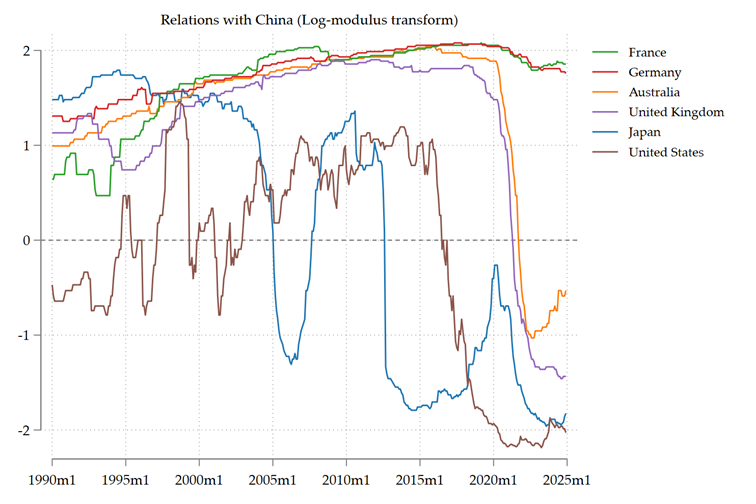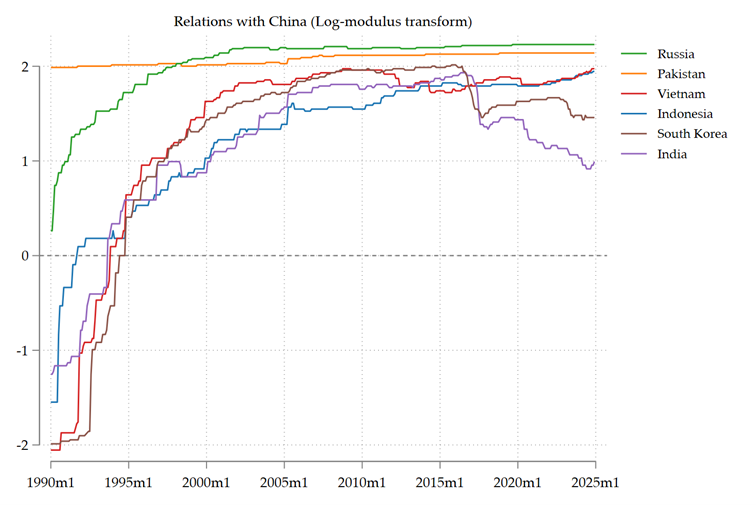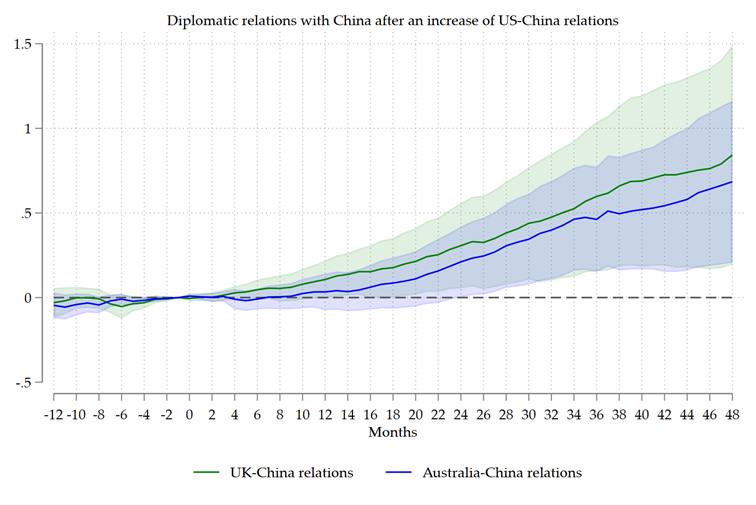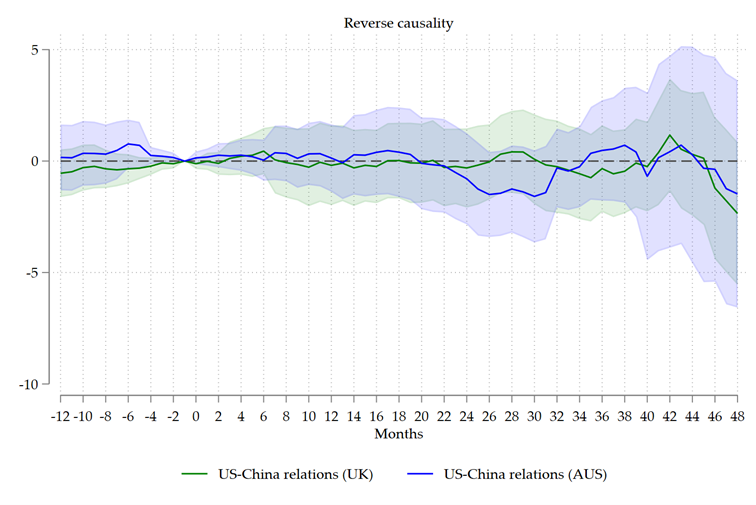Today, we are pleased to present a guest contribution written by Jamel Saadaoui (Université Paris 8-Vincennes).
A lot of my friends, economists or econometricians, do not really like the concept of Granger causality. To some extent, the essence of the concept of Granger causality is expressed in the Latin locution post hoc ergo propter hoc. This means after this, therefore because of this. In numerous instances, that is a fallacy, a simple temporal precedence. But not always!
In my paper “Geopolitical Turnging Points and Oil Price Responses”, in which I propose a novel identification procedure for geopolitical turning points, I use a monthly database of geopolitical relations of China, created and maintained by political scientists at Tsinghua University, with its 12 main trade partners:
One question that arises when you look at the data is, are there strategic alliances in setting the diplomatic relations with China?
The answer is yes, to put it bluntly. How can I show that? First, I have to look at the data. Some countries have fluctuating relations, like the US and Japan; some have known a recent deterioration, like Australia and the UK, and to a lesser extent Germany and France; others have known plenty of improvements in the 1990s and have known a recent deterioration, like South Korea and India; finally, a group of countries maintain stable and good geopolitical relations with China, namely Indonesia, Vietnam, Pakistan, and Russia.
Besides, we are going to see how UK and Australia relations with China react to US-China shocks, using the local projection method (LP) and cumulated differences (long-differenced) as recommended by Pilger and Stockwell (2025).
The updated data show that the relationships with China knew contrasting evolutions over the last years (2022-2024). As you can see in Figures 1 and 2, the relations of China with France and Germany have experienced some stabilization. The relationships of China with Japan and the US have known modest improvements. The relationship of China with Australia clearly improved in the recent years.
Figure 1. China’s political relation with the West.
The relations of China with its partners in Asia, with Russia, and with Pakistan are good and stable. For Vietnam and Indonesia, the relations with China slightly improved over recent years (2022-2024). The relationships of China with South Korea and, in a more striking way, with India have known a recent deterioration. The recent fears of a water war about the Brahmaputra River being a prime example of these tensions between India and China.
Figure 2. China’s political relation with the East.
The VAR(7) is stable, so I use the local projection method with 7 lags. To assess the impact of exogenous improvement of the relation between the US and China on (a) the relation between the UK and China and (b) the relation between Australia and China, I use long-difference as recommended by Pilger and Stockwell (2025). In Figure 3, an improvement in the US-China relationship causes an improvement in the relations of the UK and Australia with China, revealing an alliance behavior.
Figure 3. Follow the leader.
In Figure 4, I also check the reverse causality to see the reaction of US-China relations after an increase in UK-China relations and Australia-China relations. No reverse causality here.
Figure 4. Alliance behavior and reverse causality.
Conclusion
As we have seen in this blog, we are living in a world with military and diplomatic alliances. The most recent data show an alliance behavior between the US, the UK, and Australia that precedes the recent creation of the AUKUS military alliance.
Further reading
Piger, J., & Stockwell, T. (2025). Differences from differencing: Should local projections with observed shocks be estimated in levels or differences? Journal of Applied Econometrics. https://onlinelibrary.wiley.com/doi/10.1002/jae.70003
Reuters (2025). Exclusive: China’s new mega dam triggers fears of water war in India. https://www.reuters.com/sustainability/land-use-biodiversity/chinas-new-mega-dam-triggers-fears-water-war-india-2025-08-25/, accessed on August 27, 2025.
Saadaoui, J. (2025). Geopolitical Turning Points and Macroeconomic Volatility: A Bilateral Identification Strategy. Available at SSRN: 5366829.
Saadaoui, J. (2025). When Geopolitics and Strategic Alliances Meet Granger Causality. https://www.jamelsaadaoui.com/when-geopolitics-and-strategic-alliances-meet-granger-causality/, accessed on August 27, 2025.
Wikipedia (2025). AUKUS. https://en.wikipedia.org/wiki/AUKUS, accessed on August 27, 2025.
This post written by Jamel Saadaoui.



